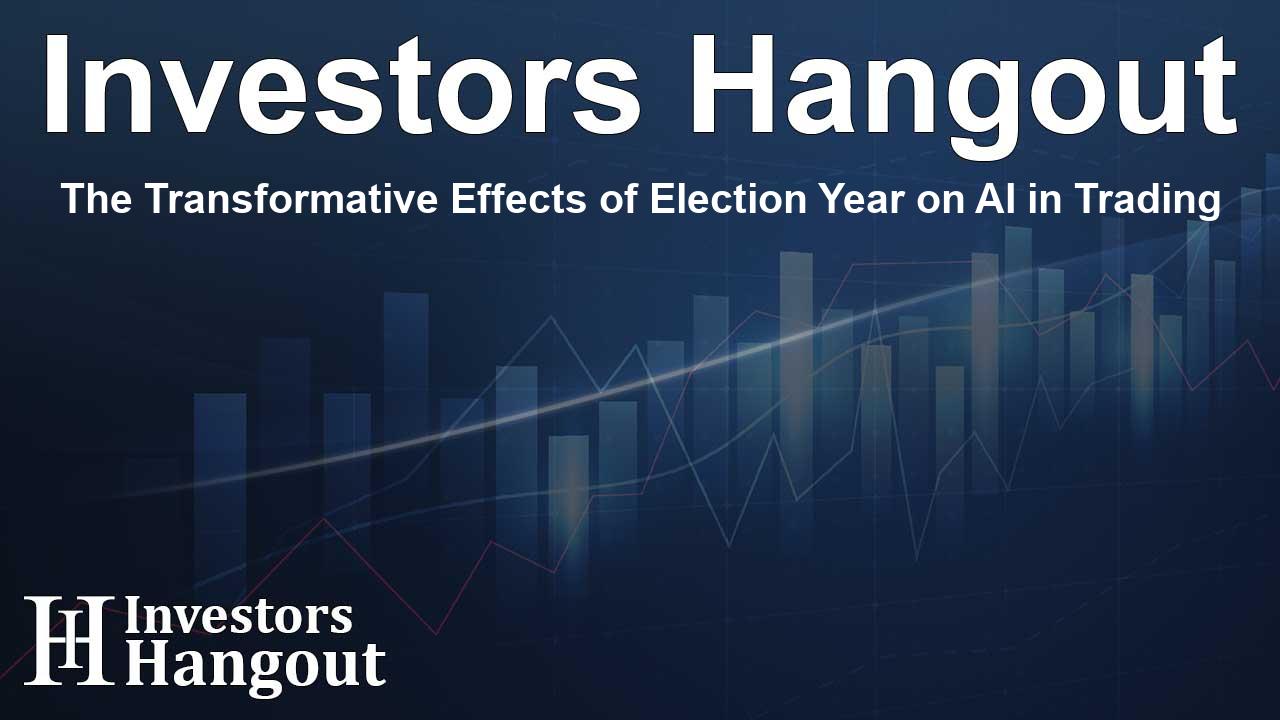The Transformative Effects of Election Year on AI in Trading

The Transformative Effects of Election Year on AI in Trading
Election years often create waves of uncertainty and excitement across the financial landscape. As the political arena heats up, investors and traders alike find themselves navigating a period marked by volatility. With the tension rising between key political figures, there’s a shared anticipation of how such developments will influence the market. In 2024, this dynamic could be particularly pronounced, affecting strategies, investments, and the growing influence of artificial intelligence (AI) within trading practices.
Understanding the Market Dynamics of an Election Year
The outcomes of elections can determine the direction of fiscal policies, which, in turn, can lead to significant fluctuations in the markets. As polling data shifts, Wall Street watches closely, recognizing that any changes in anticipated policy direction could either bolster or harm stock performance. Historically, the performance of financial markets is less about who is in the Oval Office and more about the broader economic context.
Despite this, heightened market sensitivity often accompanies close races, making election years a critical time for investors. During these periods, fear and uncertainty can lead to knee-jerk reactions, prompting many to adjust their portfolios in anticipation of changing tides.
AI's Role in Navigating Market Volatility
As AI technology evolves, broker-dealers increasingly leverage its capabilities to analyze market trends and forecast movements. The unpredictability of election years presents a unique challenge for AI systems, which must adapt to understand human behaviors and sentiment shifts that influence market conditions.
AI has the potential to offer broker-dealers deeper insights than traditional methods. Machine learning models that utilize vast datasets—like social media traffic or consumer purchasing patterns—can help identify subtle signals that may indicate market trends, particularly during election cycles.
Challenges and Opportunities with AI
Broker-dealers who have traditionally relied on quantitative analysis must also consider the qualitative aspects brought by political developments. One fundamental challenge lies in the ability to capture sentiments that sway investor behavior during unpredictable electoral scenarios.
While AI can crunch numbers and identify patterns, human analysts remain crucial for interpreting the socio-political backdrop influencing market trends. The looming 2024 election could ignite considerable trading activity, thereby testing how robust and responsive AI systems are in adjusting to real-time fluctuations.
The Emergence of Sentiment Analysis
One of the key areas where AI can shine is in sentiment analysis. By monitoring online chatter around candidates and political events, broker-dealers can discern public emotions and reactions that could materially affect trading strategies. Through effective data mining, institutions can refine their approaches to capitalize on both short-term price movements and long-term investment opportunities shaped by political discourse.
For instance, a sudden shift in voter sentiment due to a major event could lead to rapid trading opportunities, anticipating a market reaction before it even occurs. As election season unfolds, the challenge will remain for firms to integrate these insights with traditional trading strategies.
A Watershed Moment for AI in 2024
The upcoming presidential election may serve as a defining moment for the integration of AI into trading practices for broker-dealers. With the complexities of political influences now more pertinent than ever, firms must enhance their technological capabilities to remain competitive. This transition will require a careful balance of enhancing predictive technologies while ensuring the human element of ethics and judgments remains at the forefront.
As we navigate through 2024, broker-dealers who strategically employ AI technologies that analyze market sentiment, perform rapid data assessments, and generate actionable insights will find themselves better positioned to adapt to the evolving landscape. The blend of technological innovation and traditional trading knowledge could unlock new avenues of success, especially amidst the heightened volatility of election campaigns.
Frequently Asked Questions
What impact does the presidential election have on trading?
The presidential election can lead to increased market volatility as investors react to the anticipated policies of candidates, resulting in potential trading opportunities.
How can AI improve trading strategies during election years?
AI can analyze large datasets and sentiment analysis to identify market trends and shifts in investor behavior, helping traders make informed decisions.
What are the challenges of using AI in trading?
AI faces challenges in predicting unforeseen events that could sway market dynamics, especially during volatile political seasons.
Why is sentiment analysis important for traders?
Sentiment analysis helps traders understand public reactions to political events, which can impact stock prices and trading strategies.
What should broker-dealers focus on for successful trading in 2024?
Broker-dealers should focus on integrating AI technologies with human insights to navigate the uncertainties of the upcoming election effectively.
About Investors Hangout
Investors Hangout is a leading online stock forum for financial discussion and learning, offering a wide range of free tools and resources. It draws in traders of all levels, who exchange market knowledge, investigate trading tactics, and keep an eye on industry developments in real time. Featuring financial articles, stock message boards, quotes, charts, company profiles, and live news updates. Through cooperative learning and a wealth of informational resources, it helps users from novices creating their first portfolios to experts honing their techniques. Join Investors Hangout today: https://investorshangout.com/
Disclaimer: The content of this article is solely for general informational purposes only; it does not represent legal, financial, or investment advice. Investors Hangout does not offer financial advice; the author is not a licensed financial advisor. Consult a qualified advisor before making any financial or investment decisions based on this article. The author's interpretation of publicly available data shapes the opinions presented here; as a result, they should not be taken as advice to purchase, sell, or hold any securities mentioned or any other investments. The author does not guarantee the accuracy, completeness, or timeliness of any material, providing it "as is." Information and market conditions may change; past performance is not indicative of future outcomes. If any of the material offered here is inaccurate, please contact us for corrections.